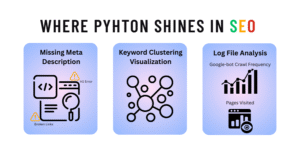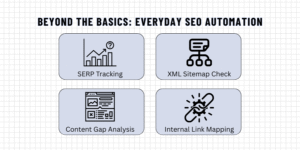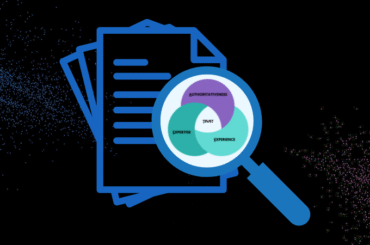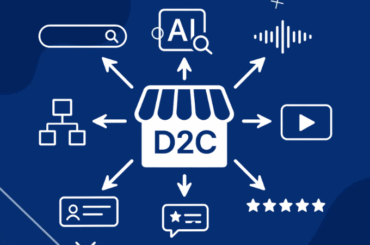Those who have ever worked in SEO know how overwhelming it can get. You’re constantly juggling keyword research, technical audits, competitor tracking, and log file analysis; all while Google changes the rules of the game almost weekly.
Doing all this manually? That’s like trying to row across the ocean with a teaspoon.
This is exactly where Python SEO automation makes life easier. By 2025-26, Python is quietly becoming one of the most practical skills for SEOs who are tired of doing endless, repetitive tasks.
Automation runs quietly in the background, pulling insights, cleaning data, and freeing you up to actually plan strategy instead of wrestling with numbers.
Let us understand how Python can streamline SEO, the tasks it’s best at handling, and how you can use it for the best results.
Why Python is a Game-Changer for SEO?
Python isn’t only for developers anymore; it’s now a marketer’s secret weapon. Here’s why it’s caught on in the SEO world:
- Easy to Pick Up: You don’t need an engineering degree to learn it.
- Library Power: With endless libraries, you can crawl sites, crunch text, or handle massive datasets in no time.
- Time Savings: What once took days in Excel can now be done in seconds.
- Scales Like a Dream: It doesn’t matter if you’re managing a small blog with 50 posts or running an e-commerce store with a million product pages; Python adjusts effortlessly to your needs.
The Bottom Line: At the end of the day, time is the real currency. Python gives SEOs a way to win some of it back.

Where Python SEO Automation Shines?
Let us now acquaint you with the three biggest areas where SEOs are using Python automation in 2025-26:
1. Crawling and Website Audits
Most SEO tools can crawl your site, but they often feel rigid. With Python, you get the freedom to build crawlers that check exactly what matters to you.
Imagine this:
- You want to check if every blog post has a meta description.
- You want a list of pages with missing H1s.
- You want to track broken links across your entire website.
The Bottom Line: Instead of checking page by page or paying for heavy enterprise tools, Python can sweep through your site and deliver a clean report in minutes.
2. Keyword Clustering and Topic Discovery
Keyword research gives you thousands of terms. Sorting them manually into meaningful groups? Forget it.
Python can cluster keywords based on intent or meaning.
For example:
- “buy running shoes online”
- “cheap men’s sneakers”
- “best sports shoes under 2000”
All of these can be grouped into one content theme.
Why it matters:
- Saves hours of manual tagging.
- Helps you build clear content silos.
- Makes search intent obvious at a glance.
The Bottom Line: By now, clustering isn’t optional. With Google moving toward intent and entities, Python makes sure you keep pace.
3. Log File Analysis
This one is less talked about but incredibly valuable.
Your server logs are like a diary of everything that happens on your website. They reveal:
- How often does Googlebot visit your site?
- Which pages get crawled the most?
- Which pages are ignored completely?
For a large website, this is priceless information.
Manually parsing log files can take forever—they’re messy and massive. Python can clean and analyze them in minutes, showing you:
- If important pages aren’t being crawled.
- If the crawl budget is being wasted on useless URLs.
- How bots navigate through your site compared to users.
The Bottom Line: If you’ve ever wondered, “Why is Google not indexing my most important pages?” — log file analysis with Python might hold the answer.

Other SEO Tasks You Can Automate with Python
Python isn’t just handy for crawling, keyword clustering, or log analysis—it can actually take over a whole bunch of smaller jobs that eat up hours of your time. A few examples:
- SERP Tracking: Instead of paying for pricey rank trackers, you can keep an eye on keyword movements with your own custom setup.
- Image SEO Checks: Missing alt text? Broken file names? Python can scan through your images in one go and highlight what needs fixing.
- Content Gap Analysis: With Python SEO automation, you no longer need to spend days comparing your competitors’ pages and how they are beating you.
- Internal Link Mapping: See how your pages connect (or where they don’t). Think of it as drawing a mini roadmap of your site’s structure.
- XML Sitemap Check: Ensure your sitemap actually works and search engines can crawl every page you’ve listed.
- The Bottom Line: If you find yourself repeating the same SEO task over and over again, Python can be trained to handle it.
The Human Side of Automation
One concern SEOs often raise is: “Will automation replace me?”
The answer is no. Automation doesn’t replace strategy, creativity, or critical thinking. It replaces the grunt work.
For example:
- Those five hours of cleaning keyword data are condensed into five minutes of running a script, and the rest of the time is spent building a content strategy.
- No need to check those 200,000 server log lines manually; when you can simply focus on fixing the technical SEO issues they reveal.
The Bottom Line: Automation shifts your role from “data janitor” to “SEO strategist.” And that’s precisely where the industry is heading in 2025-26.
Best Practices Before You Automate
Python SEO automation is exciting, but diving in without prep can cause more chaos than clarity. A few simple habits will keep everything running smoothly:
- Follow Robots.txt: Respect site rules when crawling. Ignore them, and you risk getting blocked or penalized.
- Start Small: Pick one task, test it, then expand. Don’t try to automate everything in one go.
- Leave Notes: Jot down what each script does so you (or your team) can reuse it later without confusion.
- Schedule Runs: Set scripts to run automatically instead of hitting “start” every time. Saves loads of effort.
- Show, Don’t Dump: Raw data is messy. Turn it into reports, charts, or dashboards so it’s easy to understand.
The Bottom Line: At the end of the day, automation should feel like a shortcut, not an extra layer of complexity.

What the Future Holds: SEO + Python in 2025-26
You will see further depth in the relation between SEO and automation. Let us check some trends that are already shaping due to this combination:
- Smarter Keyword Clustering: Machine learning combined with Python is making grouping keywords faster and far more accurate.
- Always-On Monitoring: Forget waiting for weekly reports. Real-time dashboards now keep you updated instantly, so you can act the moment something changes.
- Entity SEO is Growing: Search engines are shifting focus to people, brands, and places. Python scripts can help spot and optimise for these connections.
- Voice Search Insights: As voice queries grow, Python is helping marketers analyze natural language data and adjust content accordingly.
The Bottom Line: By 2025-26, automation is becoming the backbone of serious SEO strategies.
Ready for Python SEO Automation? Partner with Straction Consulting
Reading all about how Python SEO automation works won’t work alone! You still need someone who knows what to automate, what to leave manual, and how to turn all that data into action.
That’s where Straction Consulting Pvt. Ltd. comes in.
We don’t just hand you code and say, “Good luck.” We sit down with you, figure out the bottlenecks that are wasting your team’s time, and then build automation that actually makes sense for your business.
Sometimes that means custom crawlers. Other times it’s keyword clustering at scale. For a few clients, it’s been log file analysis that uncovered why their top pages weren’t even being crawled. Every business is different, that’s the point.
So instead of drowning in spreadsheets or paying for tools that only solve half the problem, you could:
- Let us design workflows that run while you sleep.
- Turn messy SEO data into clean, clear insights.
- Focus on strategy, while the grunt work takes care of itself.
If 2025-26 is the year you finally want to stop chasing SEO tasks and start leading the game, partner with Straction Consulting. We’ll help you do less busywork, see results faster, and actually enjoy the process.






